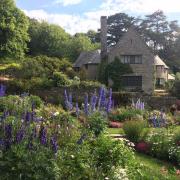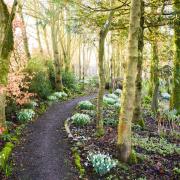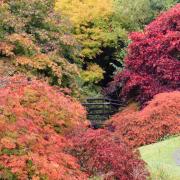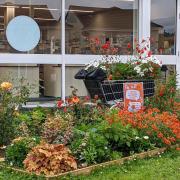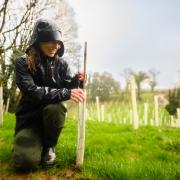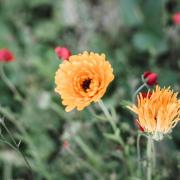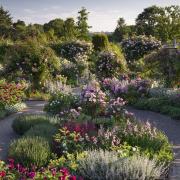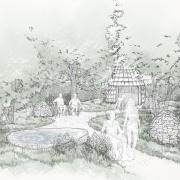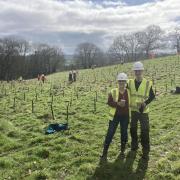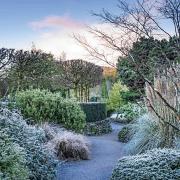Jess Wynne explains why Docton Mill Gardens were an obvious candidate for inclusion in a new film and book project
Docton Mill Gardens are among the stars of 'The Heart of a Garden', a unique new film and book project, the culmination of a two-year-long 'treasure hunt' searching for the best that nature has to offer. 'The Heart of a Garden' discovers the stories of the people behind the gardens - and throws humour, history and adventure into the mix, aiming to appeal to the gardener and non-gardener alike.
Selecting the gardens to feature was no easy task, not only did they have to be visually fabulous but the team behind the project was looking for gardens that had something else special about them, from humorous anecdotes to moving messages. Filmed across the seasons, the 'Heart of a Garden' seeks to reveal reasons to visit gardens at more times of the year. Docton Mill Gardens proved a perfect venue to explore the project's aims.
A lush, verdant paradise
Hidden away on North Devon's Hartland peninsula, itself an Area of Outstanding Natural Beauty and of startling contrasts, you would expect these gardens to be pretty special and they don't disappoint. Created around the waterways of an ancient mill, the gardens are a lush, verdant paradise. They are also the scene for an inspiring story as they were to prove the catalyst for a major lifestyle change for owners John and Lana Borrett who first came to Docton in 1999.
John describes buying Docton Mill as "the worst property deal I've ever been involved in." He and his wife were "so, so besotted... It meant so much to us as we were both getting out of careers that we didn't like". They described Docton as "magical, completely mind-blowing", but the couple took a huge risk in taking on the business - neither had any experience of horticulture or of running a garden.
A team effort
With the assistance of head gardener Sue Bramhill, John and Lana now run the garden together; it is very much a team effort. Lana works tirelessly in the tearooms whilst John revels in the freedom of working outside. Getting out of the rat race seems to have been fortuitous for the couple's relationship, too. John hints that the pair had tremendous difficulties in the past, but now describes their marriage as very strong. Docton Mill has brought the Borretts together, given them something meaningful to work towards.
Docton in spring
One of the most fulfilling times to visit a garden is in spring, and Docton is no exception. The natural world has awoken from winter and new life is blooming. Star magnolias (Magnolia stellata, varieties 'Water Lily', 'Royal Star' and 'Rose King') provide interest for early spring in Caleb's Field, a formal area boasting deep herbaceous borders in painterly tones of silver, blue, pink and mauve.
A little later in the year the gardens are awash with a dazzling sea of daffodils, a joyous display of uplifting bright yellow with an astonishing 20,000 varying species. These extrovert characters contrast with the more subtle, understated charms of hellebores - in different shades from cream to deep reds and even blacks. The bog garden provides the moist, shady conditions suitable for hostas, and the alien-like and very aptly named skunk cabbage, with its large, oval, acid-yellow flowers and stinky scent.
May finds the garden at its most exuberant. At heart Docton Mill is a very green garden, both in its wild natural beauty and in the belief of its gardeners that no chemicals should be used. One spot that echoes the determination not to suppress nature, but to work with it, is the walk up to the Leat. It may be undeveloped, but its very wildness gives it a mellow, soothing beauty. Bluebells and wild garlic run riot, and musical birdsong fills the air emphasising the healthy, natural atmosphere. The woodland garden above the house is also carpeted with bluebells, delicate cherry blossom mingling with the start of the new foliage on the trees. Rhododendrons, dotted through the woodland, add an extra burst of colour.
Into the summer...
But Docton Mill is emphatically not just a spring garden. In fact June is head gardener Sue's favourite time in the garden. "Obviously spring's very nice, but everyone has daffodils! I like to see the summer plants coming through, all the different colours," she says. The herbaceous border is spectacular and interspersed with some 90 species of roses - Winchester Cathedral, Brother Cadfael, Constance Spry and François Juranville to name just a few.
August is a time for the summer garden with its hot colours, sunflowers, dahlias (varieties include 'Bishop of Llandaff' and 'Rosella'), gladioli, rose 'Sharlachglut' and the shapely daisy-like flowers of the white cosmos.
With so much to see it might come as a relief to discover that Docton Mill also has a growing reputation for providing superb food, using local produce and ingredients grown in the garden. It even serves award-winning cream teas, so no excuse not to try them as you may well need to replace vital calories after exploring the woodland walks of this nine-acre garden!
Docton Mill has surely worked its magic on its new owners, providing them with an alternative lifestyle which has made them both genuinely happier. Getting back to nature and leading simpler lives isn't always an option, but the benefits of a garden like Docton Mill are there for anyone to enjoy.
'The Heart of a Garden' film, narrated by Richard Briers, and the accompanying photographic book, give a fascinating insight into Docton Mill and many other breathtaking gardens. To find out more see www.theheartofagarden.com.
READER OFFER
Buy 'The Heart of a Garden' book and double DVD set (RRP £39.98) and receive a £10 discount and free P&P. Purchase online at www.theheartofagarden.com/order
or (01326) 376064, remembering to quote the code DL306.





